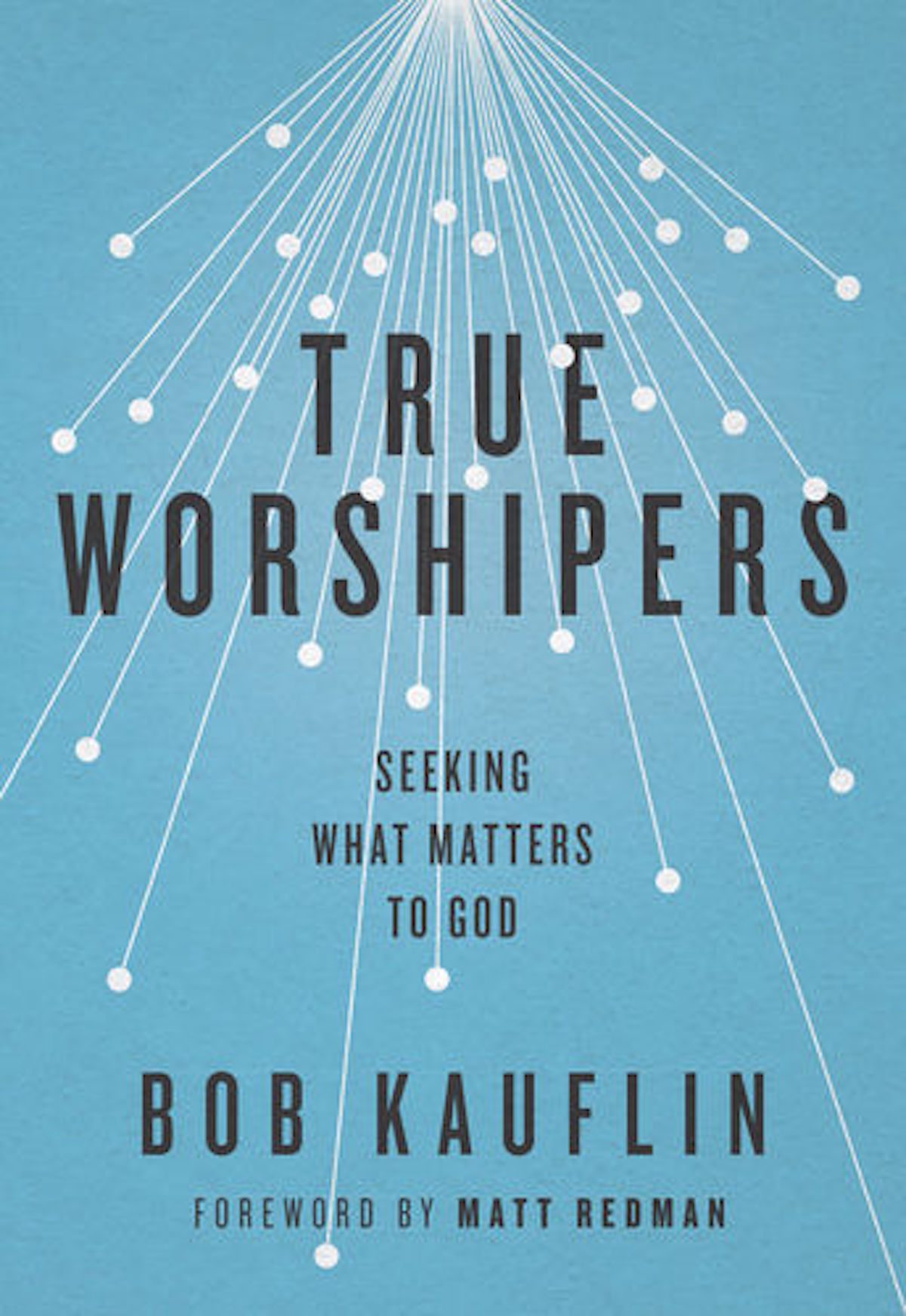Is it possible to talk about worship in evangelical circles without talking about music? Probably not, since the first thing that comes to our minds when we hear the words “worship” or “worship service” is usually music—which also conjures up all sorts of negative or positive connotations and a whole church-culture war.
Yet this is a question we should seek to answer wisely, which is what veteran songwriter Bob Kauflin hopes to do with his new book, True Worshipers: Seeking What Matters to God. The book is a follow-up to his excellent Worship Matters (Crossway, 2008) [review], which was written primarily for worship leaders. In this new work, the musician seeks to dispel the notion that worship primarily has to do with music.
The final destiny for Christians, Kauflin observes, is a grand worship service where God’s servants “will worship him” before the throne (Rev. 22:3). Since the culmination of redemptive history is heavenly worship, he asks, “What does [worship] mean for us now? Does it make any difference? What does it even mean to be a worshiper of God?” (24). These questions form the central concern of True Worshipers.
Considering True Worship
After defining what a true worshiper is from John 4, Kauflin spends several chapters considering what a true worshiper does. In chapter 2, he connects the worship of God with the Word of God. Chapter 3 focuses on exalting God inwardly and outwardly. The essence of worship, Kauflin contends, is exaltation—exalting God not only with our hearts but also with our actions.
Chapter 4 addresses how the weekly worship gathering is vital to the believer and offers regular, intensified benefits. Chapter 5 takes a close look at the priorities involved in believers edifying one another in worship. Chapter 6 addresses the role of singing and music, which is followed by another chapter in which Kauflin answers common questions he regularly hears about congregational singing. In chapter 8, he addresses the problem of desire and asks how a believer can grow in their desire to be in God’s presence within a community. And in the final chapter, Kauflin sets a tone of anticipation for future worship in the new heavens and new earth, and considers the sort of impact this might have on present-day realities.
Thinking Biblically
Evangelical churches are often tempted to change their worship services in order to gain interest from outsiders and to keep up with the culture. And so they adopt certain pragmatic measures, mostly with respect to music and atmosphere, but also with sermons and buildings.

True Worshipers: Seeking What Matters to God
Bob Kauflin
In contrast to churches with pragmatic aims, Kauflin rightly emphasizes that true worship is more about receiving from God than giving to God. It is this emphasis on understanding worship via the truth of the Bible that shines in True Worshipers. Worship is indeed a gift from God, and thus our first responsibility isn’t to give but receive (31–32). Pragmatism is ultimately misleading, then, since it places the emphasis solely on the individual—my wants, my aims, my worship—rather than on the vertical and horizontal dimensions of worship revealed in Scripture.
True worshipers see worship as a response to God’s gift of himself, chiefly through his Word—an idea that reverberates throughout the book. Indeed, true worship is always a response to God’s Word (40). Or as Kauflin puts it, “We need God to worship God” (68). Therefore, thinking about worship biblically rather than individually is vital. Personal preference must never be allowed to dictate the goal and outcome of worship. To the contrary, the goal of worship is God’s glory and our good.
Worship’s Starting Point
I also find it refreshing how Kauflin addresses several misconceptions floating around contemporary churches regarding worship, not least of which is the creative aspect involved. Worship conferences are often filled with sessions on creativity—be it in dynamic music, atmosphere, lighting, ambiance, or song writing. The motive in these sessions is to create a transcendent worship experience, something that stirs the heart and keeps the worshipers returning each week. According to this type of thinking, if the heart is compelled to worship due to these elements, then we know God is present.
To this mistaken notion Kauflin rightly responds that there’s nothing we can do to summon God to worship. “We don’t create worship,” he writes, “We respond to what we’ve received in Jesus Christ—eternal life” (39). Therefore, the gift of eternal life through Jesus—not the experience of worship—can be the only final basis of our coming to him, leading to a humble posture before him. This is worship that relies solely on divine grace, not human ingenuity. God saved us according to his own mercy (Titus 3:4–5), and so “worship that doesn’t begin with mercy is no longer worship” (39).
Pastoral Endeavor
Books of this sort have been attempted many times over. Is this new one worth your time? Yes. Bob Kauflin has a unique voice and experience. He’s led not only a generation of church musicians to think more theologically about worship, but a generation of preaching pastors too. His wisdom, pastoral insight, and decades of experience is evident throughout True Worshipers. As a result, I continue to gain deep appreciation for him and for his writing ministry.
The kind of careful, kingdom-thinking demonstrated in True Worshipers proves once again that worship leading is a pastoral endeavor. Those who have led worship services over long periods of time—who serve in places where the ministry of the Word is central and guides the service, and where the authority of the Word isn’t compromised—are the sort of people we should hear expound on true worship and true worshipers. They know that more is at stake when God’s people gather than the singing time. It is an utterly unique experience every time we meet.
“There are no normal Sundays,” Kauflin writes, “Just fresh opportunities to behold the glory of the Lord” (83). I wholeheartedly agree.

































